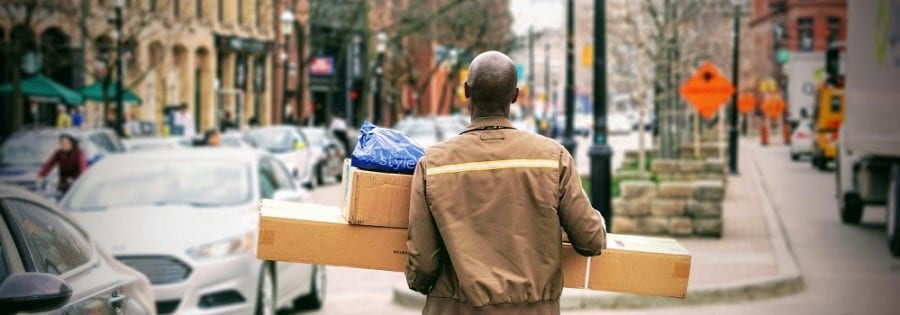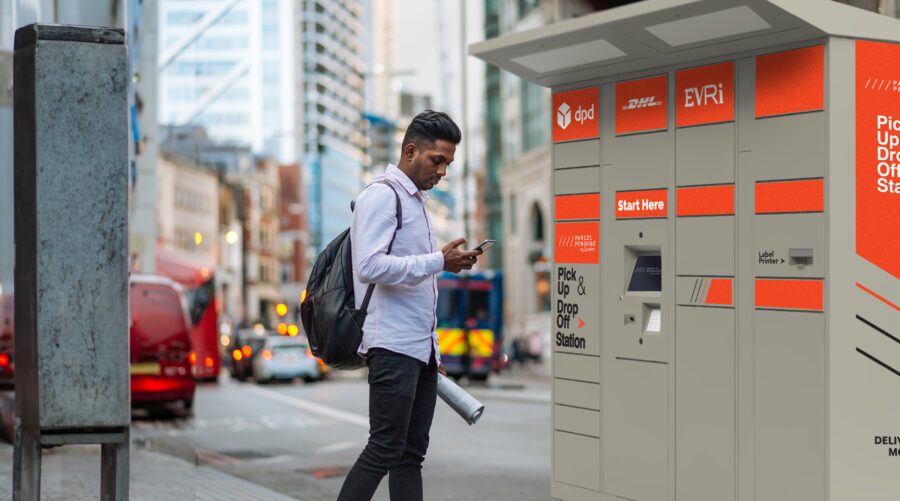
Multifamily
Multifamily Apartment Package Delivery is Increasing
Written by: Parcel Pending
9 Min Read
Published: July 12, 2019
Updated: April 4, 2023
The e-commerce revolution of the 21st century has ushered in an era of sweeping change. And, while these changes have solved many problems, they’ve also resulted in a number of unintended consequences.
If you’re a property manager for even a few multifamily housing units, you may have experienced one such ripple effect: a significant uptick in the number of incoming packages at your property. While this may have felt like a minor issue at first, it has very likely become a logistical nightmare for both you and your residents. To make matters worse, multifamily apartment package delivery is expected to continue its exponential increase.
How can property managers adapt to handle the complex logistics associated with this parcel volume increase? Read on to find out.
Multifamily Apartment Package Delivery is Increasing
The number of package deliveries at multifamily buildings is growing year-over-year and projected to continue trending upward, especially in light of COVID-19. Package delivery statistics indicate that many properties have been seeing peak-like package volume since March, with that number only expected to increase further as we approach the holidays1,2. That means that multifamily properties could see as many as 486 incoming packages per week during the 2020 holiday season, nearly double “normal”, pre-COVID package volume.
Prior to COVID, Multi-Housing News had this to say about problems caused by rapidly increasing package volume3:
61 percent of community managers report that package deliveries have increased year over year. For the average apartment community, that’s roughly 150 packages per week delivered to their door. However, that number jumps to an average of 270 packages per week during the holidays—that’s an 81 percent increase during peak package season.
While most apartment buildings (77 percent) now have a dedicated space for package storage, some property managers say their buildings’ package storage solution is inadequate, especially during high volume periods. To further complicate the matter, packages are becoming more difficult to store with residents ordering heavy, oversized, and perishable items.
The National Multifamily Housing Council echoed these sentiments in a 2018 survey about package delivery4. The report covered a variety of issues but the relevant figures include:
How property staff notify residents about a package delivery:
- 45% – Package check-in system with e-notifications
- 34% – Text/email
- 18%– Phone call
- 6% – Paper notification
- 6% – Lobby/mailroom display
How packages are stored:
- Store them in a management office or mail room – 52%
- Deliver to residents’ doors – 32%
- Keep packages in separate storage area – 22%
- Leave packages in package locker area – 13%
- The shipping carrier takes back package until in-person delivery – 10%
The vast majority of multifamily apartment communities are inadequately prepared to handle a continuous influx of deliveries, let alone the shipment increases experienced since the start of the pandemic. Property mailrooms or mail centers are often too small to accommodate significant increases, and now most property staff are trying to find ways to do more with less time and resources.
The Package Problem is Costly
In a separate study on the mounting package problem, AvalonBay found that their properties were averaging 1,000 package deliveries per month and that this increase was creating significant labor costs for their communities. And they’re not the only ones. Happy Co. writes5:
But the issue at hand isn’t simply the volume of packages received. The drain on your staff’s time and labor are preventing them from attending to more important property concerns. Houston-based Camden Property Trust estimated 10 minutes in lost productivity for each package across its 59,000 units in 2015. At a rate of $20 an hour for employee wages, package management was costing them an estimated $3.3 million annually.
Even if it feels like it only takes a few minutes to receive, store, sort, and deliver a package to a resident, that time can quickly add up, not to mention the time that gets wasted due to constant interruptions to your workflow. While the effort spent on a distraction may seem trivial, the time it takes for your brain to return to the previous task and actually focus is significant. A recent U.C. Irvine study found that, following a significant distraction or interruption to work, it takes a person an average of 23 minutes and 15 seconds to return to their original focus6.
It Impacts Your Residents’ Happiness
On top of operational and staff efficiency costs, residents are reporting growing concerns over package theft, damage, and loss. The unfortunate truth is that a steady stream of packages delivered and left unsecured provides porch pirates with seemingly limitless opportunities to steal packages in plain sight and with no recourse.
Since the start of the pandemic, this problem has only become more paramount. From March to July of this year, 1 in 5 Americans reported a stolen package. And the majority of package theft – 40% – occurs in apartment communities7.
According to a 2020 ValuePenguin survey:
- 54% of consumers reported multiple package thefts in the past 12 months.
- Americans lost an average of $106 to porch piracy, with respondents reporting losses as high as $4,800 from a single package.
- 30% of package theft victims did not get all of their money back.
- Less than half of the survey’s respondents said their thief was caught.
- Gen Xers and Millennials accounted for more than 42% of package thefts, and 64% of all incidents since last year.
A stolen package not only costs residents money, but it also leaves them feeling insecure about the place they live in. This sense of anxiety over the safety and security of their apartment can be an influencing factor in resident retention and whether or not they decide to recommit when their lease comes to term. It might also impact what they have to say about their apartment community on social media or apartment review sites, potentially scaring off prospective residents with complaints of package theft.
So, what can property managers implement as a solution to package theft and mailroom logjams?
Smart Package Mailrooms – the Answer to the Package Problem
With the package volume on track to become an even bigger problem, companies like Parcel Pending have emerged to provide game-changing apartment solutions in the form of smart parcel lockers. A smart locker system like apartment package lockers or lite lockers uses state-of-the-art technology to automatically accept, store, protect, and deliver packages of various shapes and sizes to residents at multifamily apartment communities. Intelligent lockers, like those offered by Parcel Pending, often come in modular, flexible configurations. This allows communities to customize the automated parcel locker systems to meet their unique package management needs. Each system comes with one tower with a kiosk touchscreen that allows for the delivery and retrieval of packages. Other useful features of smart lockers include:
- Smart Technology – Intelligent locker technology, like infrared scanning, allows the locker to sense when a package has been delivered, then notify the package recipient about its arrival.
- Mobile-Friendly – Parcel Pending’s free mobile app works on both iOS and Android devices, and allows residents to:
- Receive a delivery notification via push alert
- Open their respective locker with the touch of a button, allowing them to retrieve their package contact-free
- Set vacation mode
- Access package delivery history and update account settings
- Courier Agnostic – Intelligent lockers will accept packages from any courier service or shipping company, and even collect a signature from the package recipient upon delivery.
- Secure – The lockers come with photo capture and optional cloud-based security to monitor each and every interaction with the locker, whether it’s parcel delivery or retrieval.
- Fast – Barcode scan technology makes it easy for courier services to deliver and for residents to pick-up.
- Modular – Not all packages are the same. Thankfully, lockers are capable of accepting practically any package weight, size, or shape. If your property receives a large volume of oversized packages, Parcel Pending can provide a solution to support you.
- Customizable – Lockers can be customized to meet your desired property aesthetics and branding. Parcel Pending offers Oyster White, Stone Grey, Brown Grey, and Jet Black lockers, but can also provide custom colors and wraps on request.
- Temperature-Controlled – A growing number of people are having groceries, medicines, and other perishable goods delivered to their homes. In fact, Parcel Pending has seen a 42% uptick in requests for refrigerated lockers this year. Parcel Pending’s refrigerated lockers can help accommodate all of your residents’ temperature-sensitive goods and deliveries.
Benefits of Smart Lockers
Intelligent lockers are the best solution to handle the logistics of the growing package problem, and they provide a number of important benefits for both property managers and residents, including:
-
- Reduced Operational Costs – Parcel Pending found that intelligent lockers can eliminate up to 24 hours of time each week that would otherwise be spent accepting, sorting, and distributing packages.
- Increased Resident Satisfaction – A Cortland Partners Resident Survey found that “76 percent of residents strongly preferred having lockers compared to traditional office pickup, and 40 percent of residents said that they were more likely to renew their leases due to the added amenity of the parcel lockers”8.
- Increased Revenue – Although many properties offer access to the locker bank as a free amenity for residents, some property managers charge a moderate monthly fee in order to use the smart lockers. In those situations, residents are happy to pay for locker access in exchange for peace of mind about all of their special deliveries.
- Provide a Contact-Free Amenity – Americans are increasingly demanding contact-free pickup options. In fact, a recent study shows that 87% of consumers prefer contact-free pickup options like an electronic locker. Meet growing resident demand for contact-free amenities with Parcel Pending’s intelligent locker solutions.
Prepare For The Continued Package Onslaught
The last decade has shown a significant year-over-year increase in the volume of packages shipped annually, and it appears that growth is not about to slow down any time soon.
A recent study by Accenture estimates that 77% of consumers want their online purchases delivered to their home9. This compounds an already significant increase in parcel delivery volume since the start of the pandemic. As shoppers continue to migrate away from brick-and-mortar retail to virtual shopping experiences, property package problems will only get worse. That is, unless you do something about it.
Fortunately, Parcel Pending has everything you need to help curb this problem. The biggest package theft prevention tip we can share is to install smart lockers at your property. By installing smart lockers, you can assuage resident fears of porch piracy and ensure that your staff isn’t wasting valuable time in the mail center processing resident packages. If you are in the market for a package management system for an apartment, reach out to our team today and let us share how we can partner with you to curb your package problem!
Adding new amenities may not be at the top of most properties’ to-do list right now. But if package management has gotten out of hand, Parcel Pending is available to help. Contact a member of our sales team to find the right solution for your property.
Sources:
- Parcel Pending. Package Delivery Statistics. (2019, July 12). https://www.parcelpending.com/blog/package-delivery-statistics.
- Parcel Pending. (2020, June 18). Multifamily Communities Should Expect Holiday-Level Package Volume Throughout 2020 Per Parcel Pending [Press release]. Retrieved from: https://www.parcelpending.com/blog/multifamily-communities-should-expect-holiday-level-package-volume-throughout-2020-per-parcel-pending/.
- Haughey, Rick. Multi-Housing News. Handling the Package Delivery Challenge. (2019, January 2). https://www.multihousingnews.com/post/signed-sealed-delivered/.
- National Multifamily Housing Council. (2018, November 14). Special Delivery: 2018 NHMC/Kingsley Package Delivery Report [Press release]. Retrieved from https://www.nmhc.org/news/
- Chadwell, Ben. Happy Co. Package Problems? Get the Play-by-Play on Solutions for Multifamily Package Management. (2018). https://happy.co/blog/multifamily-resident-package-management-solutions.
- Mark, G., Gudith, D. & Klocke, U. University of California, Irvine Department of Informatics & Humboldt University Institute of Psychology. (2008). The Cost of Interrupted Work: More Speed and Stress [Study]. Retrieved from: https://www.ics.uci.edu/~gmark/chi08-mark.pdf
- ValuePenguin.com. (2020, July 9). Survey Finds 1 in 5 Americans Were Victims of Porch Pirates Since the Start of COVID-19 Stay-Home Orders [Press Release]. Retrieved from: https://www.prnewswire.com/news/valuepenguin.com/.
- Parcel Pending. (2018, July 17). Parcel Pending Expands Partnership with Cortland After Initial Installs Demonstrate High Resident Satisfaction & Renewal Intent [Press release]. Retrieved from: https://www.parcelpending.com/blog/parcel-pending-expands-partnership-cortland-partners-initial-installs-demonstrate-high-resident-satisfaction-renewal-intent
- Accenture. (2020, October 1). Most U.S. Shoppers Want Retailers to Close on Thanksgiving Day, Accenture Survey Reveals [Press release]. Retrieved from: https://newsroom.accenture.com/



